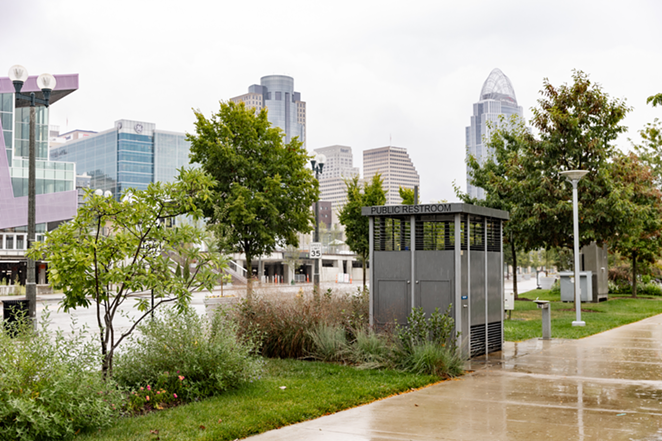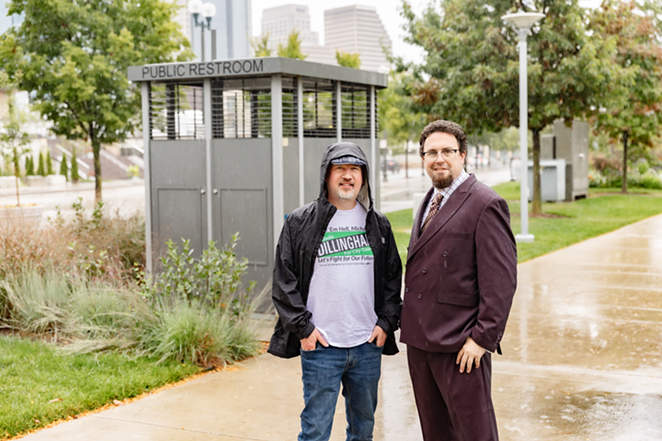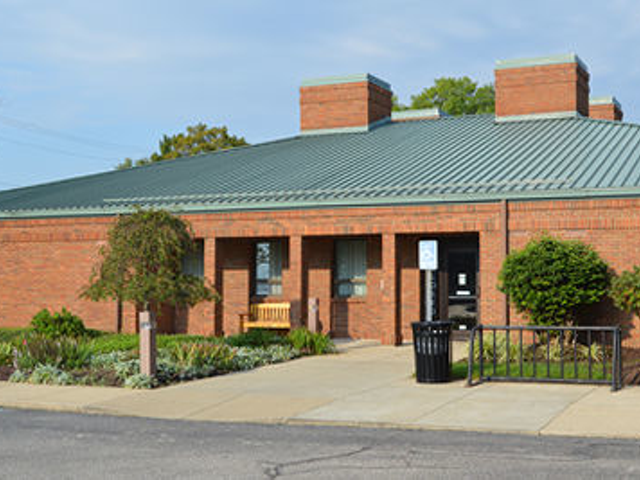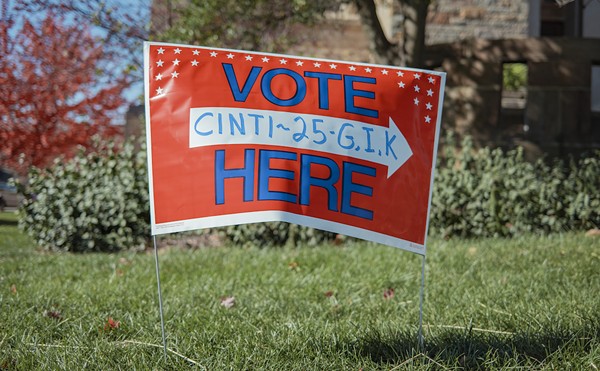
Public restrooms are generally nondescript, sterile places, and the Portland Loo at 9 W. Mehring Way on the far end of Smale Riverfront Park is no exception. It’s squat, gray and utilitarian, and since its 2015 installation it has existed in quiet obscurity next to Paul Brown Stadium, which is shuttered for half the year.
The Portland Loo also happens to be the symbol that inspired Jason Haap and Justin Jeffre, the founders of Cincinnati’s regional PHLUSH (pronounced “flush”) chapter. PHLUSH (Public Hygiene Lets Us Stay Human) pushes for equitable public toilet availability and, through the organization, Haap and Jeffre hope to change the way Cincinnati looks at one of our most basic needs.
“It's kind of a strange thing to talk about, toilet accessibility,” Haap tells CityBeat. “But all of us probably have had more than one experience of being in a situation (when) we didn't have one. It seems so basic, but I think that’s why it gets overlooked.”
Haap’s and Jeffre’s work for public restroom access started around 15 years ago when their joint media advocacy and work with the Greater Cincinnati Homeless Coalition caused them to stumble upon the continuing lack of public restrooms around Cincinnati, even as the city began to redevelop Over-the-Rhine and other neighborhoods.
“We were putting dog parks down by Washington Park because we’re worried about where canines are going to go to the bathroom in the concrete jungle of an urban environment, but nobody’s talking about the people,” Haap says.
When the two learned about Portland Loo — a brand of standalone bathrooms that’s available to the public around the clock — and the effort to install the one that currently occupies Smale Riverfront Park’s far end, it was a “no brainer,” especially when taking the city’s unhoused residents into account. Haap, in particular, thought of his own experience with irritable bowel syndrome, a condition that causes stomach discomfort and unpredictable bowel habits requiring restroom access at a moment’s notice.
Clearly, he wasn’t the only one with the urge to go. Local streets are littered with excrement, bottles of urine and feces-stained cloth and papers.
“If you just start walking around the alleyways of downtown Cincinnati, you can see what happens when people don’t have access to a public toilet,” Haap says.
Jeffre, who had worked for the Greater Cincinnati Homeless Coalition, is especially concerned about the hygiene options for unhoused people and its effect on their dignity, calling it a “public safety and quality-of-life issue.”
The May 2020 success of Issue 7, a transit levy that Haap and Jeffre advocated for as members of the Better Bus Coalition — a grassroots organization that works on improving the local bus system — also contributed to the duo establishing PHLUSH in Cincinnati.
“With all that investment that voters (just) approved throughout Hamilton County, I saw a great opportunity for us to try and double down on that investment by getting the county commissioners and hopefully the city leaders and other municipalities to basically get on board and invest in basic infrastructure like public restrooms,” Jeffre says.
Since the Cincinnati chapter of PHLUSH’s official launch in June, the organization has advocated for more Portland Loo installations near Metro bus stations and gained endorsements from local organizations with the same goals of improving the city.
One of PHLUSH’s most notable endorsements came from Cincinnati City Council member Chris Seelbach, who was instrumental in the effort to install the city’s first Portland Loo back in 2012. According to Seelbach, the installation was ultimately successful because Willie F. Carden, the director of Cincinnati Parks in 2015, decided to install it with the approval of the Cincinnati Parks Board.
“Everyone, regardless of your homeless status, deserves access to bathrooms,” Seelbach says. “And so there are people who are experiencing homelessness and, because they don't have access to a bathroom, they're having to very undignifiedly use the restroom (in) outdoor and public spaces.”

As the organization picks up steam, other endorsements have come in from the Better Bus Coalition, the Greater Cincinnati Homeless Coalition and the American Restroom Association.
The American Restroom Association describes itself as “America's advocate for the availability for clean, safe and well-designed public restrooms.” Executive Director Tim Pyle has officially endorsed PHLUSH, with Pyle being “very impressed” by the work that Haap and Jeffre have put in so far.
“We wholeheartedly endorse what Cincy PHLUSH is trying to accomplish,” Pyle says. “We know that based on the experience of working with other organizations that it can be a very difficult and long process for new public restrooms to be implemented, and we would just encourage everyone to get involved so this process doesn’t have to take so long.”
Haap and Jeffre say the main solution to the issue of accessibility is installing more Portland Loos, a freestanding public restroom with 24-hour access designed to integrate into a city’s urban environment while discouraging defacement and crime.
Called the “Swiss Army knife” of restrooms by its manufacturer, each Portland Loo is powered by rooftop solar panels, is handicap accessible, and has strategically designed bars to deter crime while maintaining privacy. The coating on the inside of the bathroom makes it so that only a hose is necessary to clean it.
According to Rocky Merz, manager of the Cincinnati Parks Division of Communications, the operations staff who service the Portland Loo have noted that it is convenient to spray the restroom clean as needed — something that is inconvenient in other restrooms that the department services.
Using numbers from a 2017 People for Fairness Coalition presentation on Portland Loos, Haap estimates that the initial base price for each restroom is around $100,000. Proximity to water and sewage lines in addition to other logistics affect the installation costs. He says that utility costs are around $25,000, foundation work is $10,000 and general installation costs are around $5,000. This brings Haap’s approximation of the full cost to install a Portland Loo to about $140,000. In addition, the People for Fairness Coalition’s presentation estimates that maintenance runs about $11,000-$12,000 per year.
For Jeffre and Haap, the partnership with the Better Bus Coalition, the strategy to get the public on board with the idea of Portland Loo and adding more public restrooms in better locations is quite simple: put them in neighborhoods where they can be seen and used. The focus on the city’s public transportation organizations serves a big purpose for that, because the high foot traffic near transit hubs bring crowds of people who need to use the restroom.
One Cincinnati neighborhood appears to be a prime candidate for Cincy PHLUSH and its work. In Northside, where the latest Metro transit center opened in October 2020, the station services eight bus routes, but there are no public restrooms readily available for riders — something Northside Community Council President Becky Smolenski Finnigan noted in a recent letter to county commissioners in support of Cincy PHLUSH.
"Our only public restrooms — in the McKie Center and the Northside Public Library — have limited hours and are far from the hub,” Finnigan says in the letter, which was released partially by Cincy PHLUSH. “Nearby Hoffner Park has no permanent restroom facilities, adding cost and complexity to special events and criminalizing unhoused residents."
In order to meet “this most everyday of human needs,” it would require “an act of political will" Finnigan writes.
Jeffre agrees that political help is necessary.
“It's the kind of thing that governments should do, because we can't rely on private businesses and people you know, and their charity. I mean, this is basic human infrastructure,” Jeffre says.
Both he and Haap expressed frustration at the lack of support they’ve gotten from the city in that regard, although they both praise Cincinnati Parks for installing the first Portland Loo.
Continuing to work with the county’s municipalities to keep raising support for more installations is among the organization’s goals. PHLUSH’s recent meetings have been with Hamilton County Commissioner Denise Driehaus in hopes for a collaboration with the Southwest Ohio Regional Transit Authority (SORTA) board.
Jeffre uses the term “international city” to describe his vision of what Cincinnati could be once Cincy PHLUSH’s work is complete, and Haap agrees.
“I think that Cincinnati really needs to take a close look at itself and ask (itself ) if this is a place we think people should want to visit,” Haap says. “Because then we need to be able to offer the basic amenities that any visitor would expect when going to a new place, and (that includes) the ability to easily use the toilet.”
Learn about Cincy PHLUSH at cincy.phlush.org.
Read more original stories in CityBeat's recent print editions.
Sign up for our weekly newsletters to get the latest on the news, things to do and places to eat delivered right to your inbox.
Follow us on Facebook, Twitter and Instagram.






